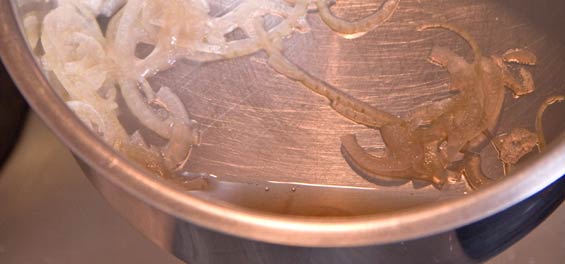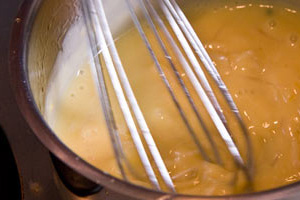HOW TO MAKE BEURRE BLANC
Beurre Blanc is a classic French sauce that is a hot emulsion of butter and wine, often with the addition of an acid (traditionally white wine vinegar, but you could use citrus juice). It is most often served over poached or grilled seafood like pink salmon fillets, halibut fillets and halibut cheeks, with other mild proteins such as chicken, or even as a sauce for steamed vegetables such as asparagus.
Note: As a hot emulsion, Beurre Blanc is a member of a persnickety family of sauces that includes the dreaded hollandaise (scourge of culinary students everywhere). Careful heat control is very important. While Beurre Blanc is not nearly as difficult as hollandaise, you still will want to keep a very close eye on it the first few times you make it and be ready with extra ingredients in case something goes wrong.
INGREDIENTS
- 4 fl oz dry white wine (if you use red wine, it’s called Beurre Rouge)
- ¾ fl oz acid (high-quality vinegar, citrus juice)
- ½ oz finely chopped shallots
- ½ lb (2 sticks) COLD butter
- Salt to taste
DIRECTIONS


Note: Your beurre blanc can be made ahead of time, although you will have to keep an eye on it. Try to keep it warm, but not hot, and remember to whisk it every now and then to keep the ingredients together.
ABOUT BROKEN SAUCES
An emulsion is a mixture of two things that would not ordinarily mix on their own. While cold emulsions, like mayonnaise and vinaigrettes, are fairly stable and can easily be re-mixed if they fail, hot emulsions can fall apart if they get too hot or too cold. If your component liquids separate and you’re left with something that looks a bit like an oil slick, your sauce has “broken.”
Broken sauces can occasionally be saved, but often with a hot emulsion sauce you simply have to start over and be more careful next time. Don’t worry, it sounds trickier and more frustrating than it is, and once you get the hang of it you will rarely lose a sauce.
WHAT TO DO IF YOUR BEURRE BLANC BREAKS
Try adding a small amount of water and whisking vigorously while either heating it up (if you think it’s too cold) or putting your pan on some ice (if you think it’s too hot). If you’re lucky you may be able to regain your emulsion.
For an example of a recipe using a modified beurre blanc, visit our Baked Sockeye Salmon with Preserved Lemon Beurre Blanc recipe.
Browse More:
Vinegar Recipes
Culinary Techniques


